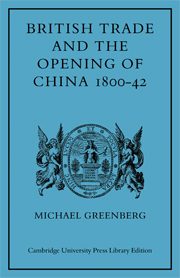Book contents
- Frontmatter
- Contents
- Money, Weights and Abbreviations
- Author's Preface
- CHAPTER I THE OLD CHINA TRADE
- CHAPTER II THE HONOURABLE COMPANY AND THE PRIVATE ENGLISH
- CHAPTER III THE CANTON COMMERCIAL SYSTEM
- CHAPTER IV THE DEVELOPMENT OF THE CANTON TRADE TO 1834
- CHAPTER V OPIUM
- CHAPTER VI BUSINESS AND FINANCIAL ORGANISATION
- CHAPTER VII THE VICTORY OF THE FREE TRADERS
- CHAPTER VIII LEDGER AND SWORD
- APPENDICES
- Bibliography
- Index
- Frontmatter
- Contents
- Money, Weights and Abbreviations
- Author's Preface
- CHAPTER I THE OLD CHINA TRADE
- CHAPTER II THE HONOURABLE COMPANY AND THE PRIVATE ENGLISH
- CHAPTER III THE CANTON COMMERCIAL SYSTEM
- CHAPTER IV THE DEVELOPMENT OF THE CANTON TRADE TO 1834
- CHAPTER V OPIUM
- CHAPTER VI BUSINESS AND FINANCIAL ORGANISATION
- CHAPTER VII THE VICTORY OF THE FREE TRADERS
- CHAPTER VIII LEDGER AND SWORD
- APPENDICES
- Bibliography
- Index
Summary
‘A pipe of old Patna, that soother of all sorrows, the manna of the mind.’
The Importance of the Opium Trade
Thomas de Quincey, in his Confessions of an Opium Eater, had one criticism to make of all that had been previously written on the subject of opium—lies! Since he wrote, much ink has been spilled on the subject, as well as blood. Opium became a ‘question’. In China it occasioned several years of warfare, in Victorian England half a century of moral conflict. It is not here intended to add to this hoary ethical, medical and legalist controversy; but because of the unique part which opium played in the Old China Trade, an examination of the economic side of the subject is necessary. Opium was no hole-in-the-corner petty smuggling trade, but probably the largest commerce of the time in any single commodity. In 1840 William Jardine defended his character as the leading opium merchant by citing the repeated declarations of both Houses of Parliament, ‘with all the bench of bishops at their back’, that it was financially inexpedient to abolish the trade. The men directing British policy at the time were not of more than average cynicism. They were helped in overcoming moral scruple by an appreciation of the size of the material interest involved. The opium trade was important not merely per se, for its magnitude and its lucrative character; though such considerations were by no means ignored.
- Type
- Chapter
- Information
- British Trade and the Opening of China 1800–42 , pp. 104 - 143Publisher: Cambridge University PressPrint publication year: 1970

